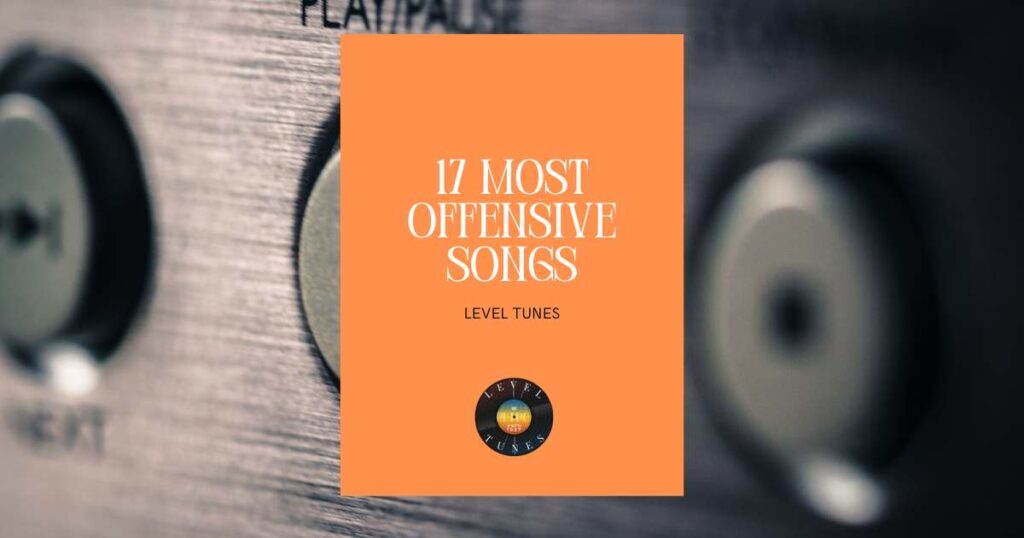17 Most Offensive Songs: 17 Controversial Songs
Hello, music enthusiasts! It’s TBone here from Level Tunes, your go-to DJ and music aficionado. Today, I’m diving into something a bit unconventional – the 17 most offensive songs in music history.
Now, you might wonder, why explore this controversial territory? Well, as a DJ and a true music lover, I believe in understanding all aspects of music, including the parts that challenge, provoke, or even offend.
This list isn’t about promoting negativity, but rather about exploring how music can push boundaries and evoke strong reactions. It’s a journey through songs that have sparked debates, raised eyebrows, and even changed the way we think about music.
So, let’s tune in and explore these tracks with an open mind and a critical ear!
Here are the most offensive songs that you can check out:
List Of Most Offensive Songs
Most offensive songs in a list format:
1. “God Save the Queen” – Sex Pistols
Album: Never Mind the Bollocks, Here’s the Sex Pistols
Year: 1977
Label: Virgin Records
The Sex Pistols, with their punk anthem “God Save the Queen,” delivered a scathing critique of the British monarchy and the social situation in 1970s Britain. Released during Queen Elizabeth II’s Silver Jubilee, this song was seen as a direct attack on the establishment, embodying the rebellious spirit of punk rock. The band, featuring Johnny Rotten, Sid Vicious, and others, became symbols of youthful defiance. The song’s raw energy and provocative lyrics make it a standout track in punk history, and its release under the Virgin Records label added to its widespread notoriety.
2. “Kim” – Eminem
Album: The Marshall Mathers LP
Year: 2000
Label: Aftermath Entertainment
Eminem’s “Kim” is an intensely graphic and disturbing portrayal of domestic violence and murder. This track, from the album “The Marshall Mathers LP,” features Eminem in a fictionalized, violent altercation with his then-wife, Kim Scott. Its explicit content and raw emotional delivery make it one of the most controversial songs in rap history. Eminem, known for his sharp and often dark lyricism, pushes boundaries here, leading to significant backlash but also discussions about the line between art and real life.
3. “Cop Killer” – Body Count
Album: Body Count
Year: 1992
Label: Sire Records
“Cop Killer” by Body Count, fronted by Ice-T, became a lightning rod for controversy due to its explicit lyrics against police brutality. Released at a time of high tension between law enforcement and communities, particularly in Los Angeles post-Rodney King, the song was seen as incendiary and dangerous. The track, from the self-titled album “Body Count,” led to widespread media outrage, political condemnation, and debates about censorship and artistic freedom. Ice-T eventually agreed to remove the song from the album, but it remains a significant moment in the history of rap and rock music.
4. “Suicide Solution” – Ozzy Osbourne
Album: Blizzard of Ozz
Year: 1980
Label: Jet Records
Ozzy Osbourne’s “Suicide Solution,” from his album “Blizzard of Ozz,” sparked controversy due to its perceived encouragement of suicide. The song was written as a warning against alcohol abuse, inspired by the death of AC/DC’s Bon Scott. However, its ambiguous lyrics led to widespread misinterpretation and a notable lawsuit claiming it influenced a fan’s suicide. Ozzy, a legendary figure in heavy metal, faced significant backlash, which fueled discussions on the impact of music on vulnerable individuals.
5. “Straight Outta Compton” – N.W.A
Album: Straight Outta Compton
Year: 1988
Label: Ruthless Records
“Straight Outta Compton” by N.W.A (Niggaz Wit Attitudes) became an anthem for expressing the frustrations and realities of life in South Central Los Angeles. The song, and the album of the same name, introduced gangsta rap to a wider audience. Featuring artists like Ice Cube, Dr. Dre, and Eazy-E, it was groundbreaking in its raw portrayal of police brutality and racial profiling. Despite, or perhaps because of, its explicit content and unapologetic tone, “Straight Outta Compton” remains a defining moment in hip-hop history.
6. “Fack” – Eminem
Album: Curtain Call: The Hits
Year: 2005
Label: Aftermath Entertainment
Eminem’s “Fack” is known for its extremely vulgar and explicit lyrics, pushing the boundaries of what is acceptable in mainstream music. Found on his compilation album “Curtain Call: The Hits,” this track was met with mixed reactions, with some praising its audaciousness and others criticizing it for being overly crude. Eminem, no stranger to controversy, uses this song to further cement his reputation as an artist who is unafraid to shock and provoke.
7. “Blurred Lines” – Robin Thicke ft. Pharrell Williams & T.I.
Album: Blurred Lines
Year: 2013
Label: Star Trak Entertainment
“Blurred Lines” by Robin Thicke, featuring Pharrell Williams and T.I., became one of the most controversial songs of the 2010s due to its lyrics and music video, which many interpreted as promoting non-consensual behavior. The song, from the album of the same name, sparked debates about consent and misogyny in music. Despite its commercial success, it faced a backlash that overshadowed its artistic merit and led to numerous discussions about the portrayal of women in media.
8. “We Can’t Stop” – Miley Cyrus
Album: Bangerz
Year: 2013
Label: RCA Records
Miley Cyrus’ transition from Disney star to provocative pop artist was marked by the release of “We Can’t Stop” from her album “Bangerz.” The song, with its suggestive lyrics and accompanying music video, was a departure from her earlier, more innocent image. This shift sparked debates about sexuality, image, and the pressures faced by child stars in the entertainment industry. Cyrus’ new direction was both criticized and celebrated, illustrating the complex dynamics of fame and personal evolution in the public eye.
9. “Born Free” – M.I.A.
Album: Maya
Year: 2010
Label: XL Recordings
M.I.A.’s “Born Free,” from her album “Maya,” is accompanied by a graphic and violent music video that led to its being banned or restricted in several countries. The video’s portrayal of genocide and police brutality was a bold political statement, sparking discussions about censorship, artistic expression, and the role of music in social commentary. M.I.A., known for her politically charged content, used this song and video to bring attention to issues of human rights and state-sponsored violence.
10. “One in a Million” – Guns N’ Roses
Album: G N’ R Lies
Year: 1988
Label: Geffen Records
Guns N’ Roses’ “One in a Million,” from their album “G N’ R Lies,” faced backlash for its racist and homophobic lyrics. Axl Rose, the band’s frontman, defended the song as a reflection of his personal experiences and feelings, but many saw it as promoting hate speech. The controversy surrounding the song highlighted the fine line between personal expression and offensive content in rock music.
11. “Judas” – Lady Gaga
Album: Born This Way
Year: 2011
Label: Streamline Records
Lady Gaga’s “Judas,” from the album “Born This Way,” stirred controversy with its religious themes and imagery. The song and its music video, which portray Gaga as Mary Magdalene, were seen as blasphemous by some religious groups. However, Gaga, known for her theatrical and often provocative artistry, used the song to explore themes of betrayal and forgiveness. The controversy did not hinder the song’s success, highlighting Gaga’s ability to create compelling and conversation-starting art.
12. “Stan” – Eminem ft. Dido
Album: The Marshall Mathers LP
Year: 2000
Label: Aftermath Entertainment
“Stan” by Eminem, featuring Dido, tells the story of an obsessive fan’s descent into madness, culminating in a tragic ending. The song, from “The Marshall Mathers LP,” was praised for its storytelling but also raised concerns about glorifying stalking and mental illness. Eminem’s portrayal of the character Stan, and the song’s exploration of celebrity worship and fan culture, make it a landmark track in his career and in hip-hop narrative storytelling.
13. “American Skin (41 Shots)” – Bruce Springsteen
Album: High Hopes
Year: 2014 (live version)
Label: Columbia Records
Bruce Springsteen’s “American Skin (41 Shots),” first performed live in 2000 and later included in his album “High Hopes,” was written in response to the shooting of Amadou Diallo by New York City police officers. The song’s portrayal of racial profiling and police brutality was met with criticism from law enforcement groups, but it also received acclaim for its poignant and empathetic storytelling. Springsteen, known as a voice for the American working class, used this song to address critical social issues.
14. “Fuck tha Police” – N.W.A
Album: Straight Outta Compton
Year: 1988
Label: Ruthless Records
N.W.A’s “Fuck tha Police” from the album “Straight Outta Compton” became an anthem for expressing anger and frustration towards police brutality and racial profiling. This provocative song led to immense controversy, drawing attention from the FBI and law enforcement due to its explicit content and perceived anti-police message. Featuring artists like Ice Cube, Dr. Dre, and MC Ren, the song is a raw expression of the lived experiences of African Americans in Los Angeles. It’s a powerful example of music as a form of social commentary, reflecting the intense socio-political climate of the time.
15. “Smack My Bitch Up” – The Prodigy
Album: The Fat of the Land
Year: 1997
Label: XL Recordings
The Prodigy’s “Smack My Bitch Up,” featured on the album “The Fat of the Land,” ignited controversy with its aggressive title and lyrics, which were widely interpreted as endorsing violence against women. The accompanying music video, which contains scenes of violence, drug use, and sexual content, was also contentious, leading to bans and restrictions. Despite the backlash, the song was a commercial success and is considered a classic in the electronic music genre. The Prodigy, particularly frontman Liam Howlett, defended the song, arguing that it was meant to be provocative and not taken literally.
16. “Relax” – Frankie Goes to Hollywood
Album: Welcome to the Pleasuredome
Year: 1984
Label: ZTT Records
Frankie Goes to Hollywood’s “Relax,” from their album “Welcome to the Pleasuredome,” was one of the most controversial songs of the 1980s due to its sexual innuendos and explicit content. The song was famously banned by the BBC, which only fueled its popularity and helped it become a massive hit. “Relax” is a key track in the history of synth-pop and dance music, and its controversy helped to bring discussions of sexuality and censorship into the mainstream music scene.
17. “Pumped Up Kicks” – Foster the People
Album: Torches
Year: 2011
Label: Startime International
“Pumped Up Kicks” by Foster the People, from their debut album “Torches,” sparked debate due to its lyrics, which describe a school shooting from the shooter’s perspective. While the song’s catchy melody made it a commercial success, the dark and unsettling subject matter led to a complex reception, particularly in the wake of real-life school shootings. The band stated that the song was intended to bring attention to the issue of gun violence in America, highlighting the often overlooked mental health aspects. “Pumped Up Kicks” is an example of how pop music can engage with serious and sensitive topics in a thought-provoking way.
Fun Facts: Most Offensive Songs
“God Save the Queen” – Sex Pistols
- Record Sales Despite Ban: Despite being banned by the BBC and several UK retailers, “God Save the Queen” still managed to sell over 150,000 copies in its first week and is rumored to have actually reached number one on the UK Singles Chart, although officially it was listed at number two.
- Iconic Album Cover: The single’s cover art, featuring a defaced image of Queen Elizabeth II, became an iconic symbol of the punk movement and was designed by Jamie Reid, known for his subversive and collage-based art style.
“Kim” – Eminem
- Live Performance Rarity: Due to its highly controversial nature, Eminem rarely performed “Kim” live. However, he did perform the song at a Detroit concert in 2000, with the performance being noted for its intense emotional expression.
- Real-Life Inspiration: The song is a continuation of the story from “’97 Bonnie and Clyde” (from “The Slim Shady LP”), which also involves Eminem’s tumultuous relationship with his then-wife, Kim Scott.
“Straight Outta Compton” – N.W.A
- Influence on Film: The song’s legacy led to the 2015 biographical film “Straight Outta Compton,” which chronicles the rise and fall of N.W.A. The film was both a critical and commercial success, further cementing the song’s place in music history.
- FBI Letter: “Straight Outta Compton” led to the FBI sending a warning letter to Ruthless Records and its parent company, expressing concern over the song’s content, marking a rare instance of direct government response to a song.
“Blurred Lines” – Robin Thicke ft. Pharrell Williams & T.I.
- Legal Controversy: “Blurred Lines” was subject to a high-profile copyright infringement lawsuit by the family of Marvin Gaye, who claimed the song copied Gaye’s 1977 hit “Got to Give It Up.” The case ended with Thicke and Williams ordered to pay millions in damages.
- Pharrell Williams’ Changed View: Pharrell Williams later expressed regret about how he wrote the song, acknowledging how some of the lyrics perpetuated sexist attitudes.
“Judas” – Lady Gaga
- Easter Weekend Release: “Judas” was released on April 15, 2011, which was Good Friday that year, adding to the controversy surrounding its religious themes.
- Direction by Gaga: The music video for “Judas” was co-directed by Lady Gaga herself, showcasing her multifaceted talent and vision for the song’s visual representation.
“Stan” – Eminem ft. Dido
- Introduction of “Stan” into the Oxford Dictionary: The song led to the term “stan” being added to the Oxford English Dictionary, defined as an overzealous or obsessive fan of a particular celebrity, highlighting the song’s cultural impact.
- Dido’s Sampled Song: The chorus of “Stan” samples Dido’s song “Thank You,” which led to a boost in popularity for the British singer and her subsequent collaboration with Eminem at the 2001 Grammy Awards.
“Pumped Up Kicks” – Foster the People
- Mark Foster’s Quick Composition: Mark Foster wrote “Pumped Up Kicks” in just a few hours, and it was initially a demo that he didn’t intend to become a breakout hit.
- Use in Public Awareness Campaigns: Despite its controversial lyrics, “Pumped Up Kicks” has been used in various public awareness campaigns about gun violence and mental health, demonstrating the song’s ability to spark meaningful conversations.
And there you have it, music lovers! A journey through some of the most provocative and controversial songs in music history. Each track tells a story, not just of the artists and the music, but also of the times and issues they represent. Thanks for tuning in to this exploration of musical expression!
Thanks for reading.
TBone




